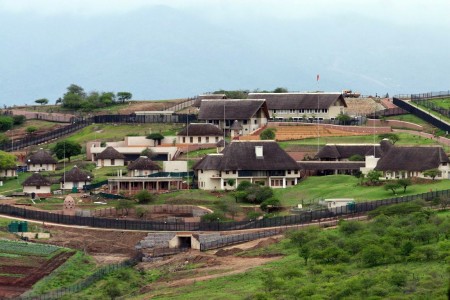Beleaguered South African president Jacob Zuma was forced to apologise to the nation on TV last Friday after a court ruled that, by using public money to make lavish improvements to Nkandla – his private country residence – he had failed in his most basic duty: “to uphold, defend and respect the Constitution as the supreme law of the land as set out in Section 83(b)”.

The African National Congress (ANC) will now hold an extended national working committee (NWC) meeting to decide Zuma’s fate, though few in the country predict he will not be able to survive this latest of the many scandals that have been a feature of his political life.
Zuma has supplemented his coterie of influential friends by bestowing power and status on a carefully chosen group, who combine to form a formidable protective shield around the presidency in return. So as long as the ANC enjoy majority support and the Party, in turn, remains behind its leader, the appetite for change that is building is unlikely to be sated by a change of leader in the short-term.
While many within the ANC appear to remain behind him, Zuma’s TV apology cut little ice with the public, many of whom rejected what he had to say. Older party members, some of whom spent years on Robben Island, are also declaring it may be time for the president to resign.
Ahmed Kathrada, who was among the eight ANC members sentenced to life imprisonment in the 1963-1964 Rivonia Trial, said that Zuma’s “continued stay as president will only serve to deepen the crisis of confidence in the government of the country”.
Kathrada was joined by Denis Goldberg who told the BBC’s Today Programme that Zuma should have “done something heroic” and resigned. Goldberg described the president’s apology as “insincere”.
Other ANC veterans took similar stands. Barbara Hogan, a former Minister of Public Enterprises, supported the critics. Ben Turok, who was jailed for fighting apartheid, declared he was deeply angered by what had taken place. “We have a situation where values of the president and his understanding of (the) constitution are wrong,” he said. “He (Zuma) doesn’t believe in constitutional democracy.”
The trade union representing the military, SANDU, issued a media statement saying it no longer had confidence in the president as Commander-in-Chief, since he had failed to uphold the constitution.
Meanwhile, South African Council of Churches (SACC) General Secretary Bishop Malusi Mpumlwana has said he is “not prepared” to accept Zuma’s apology over the Nkandla debacle.
In a statement released on Tuesday (April 5) Mpumlwana said that some church leaders had expressed the opinion that Zuma should be recalled by the ANC and further requested the SACC to make this call.
“However the SACC has not acted on these numerous requests – preferring to engage with the ANC on long-term solutions to this and other national crises,” said Mpumlwana.
ANC secretary general, Gwede Mantashe, said that their discussions would be the beginning of a process of consultation with the whole party and its allies in the trade unions and Communist Party.
While this is under way, parliament is preparing to debate a motion of impeachment, brought by the leader of the opposition, Mmusi Maimane. The debate will be the first time in the history of a democratic South Africa that such a motion has been considered.
ANC insiders say that Zuma is warning that Parliament would be dissolved if he was asked to step down. Since this would threaten the job security of many MPs they are hardly likely to risk such a step.
Removing the president – as the ANC did in September 2008 to Thabo Mbeki – is thought to be too destabilising for the party. For this reason the ANC is thought likely to refuse to ask Zuma to step down.










